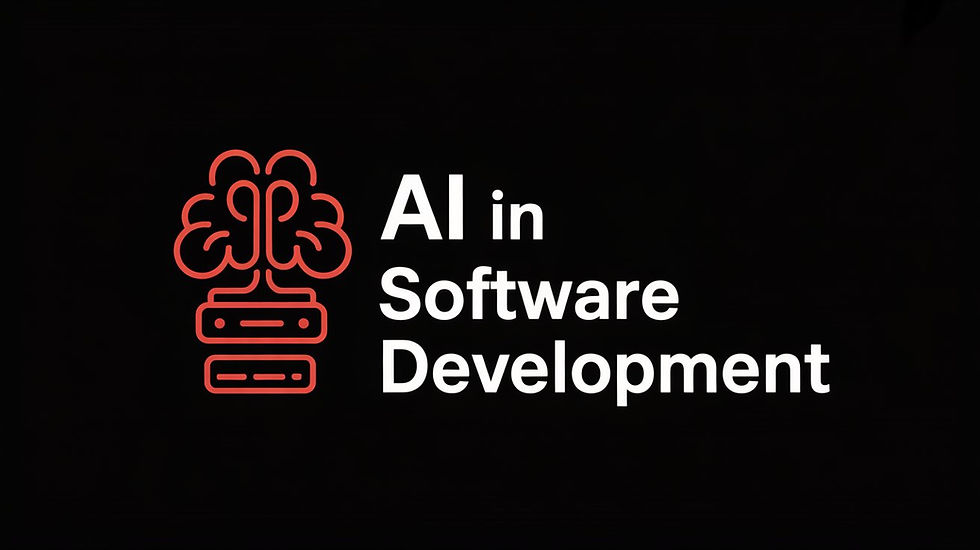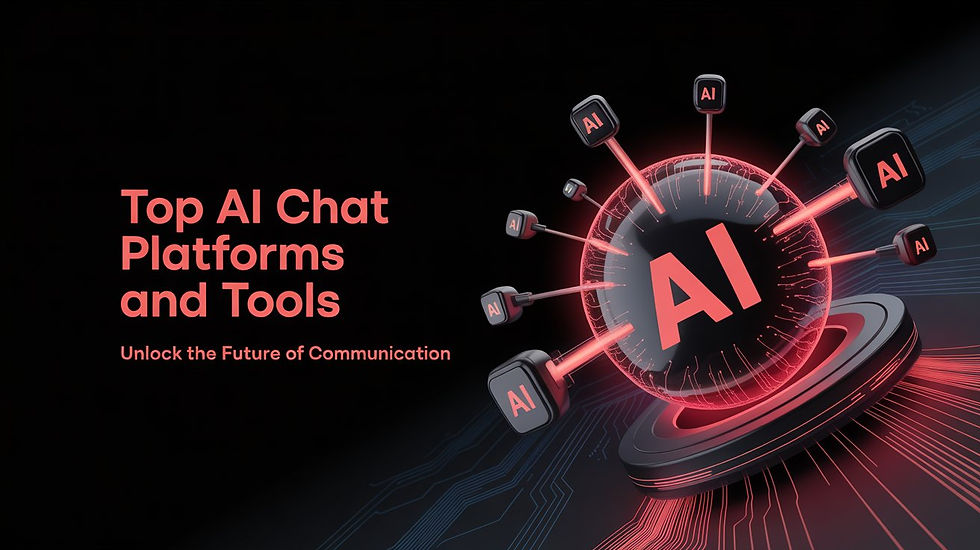AI Marketing Tools: Transforming Digital Marketing
- pengarhehe
- Aug 3
- 6 min read

AI Marketing Tools
AI marketing tools are software platforms that leverage artificial intelligence to enhance marketing workflows, from content creation to customer targeting. In essence, AI marketing uses technologies like machine learning, natural language processing (NLP), and data analytics to generate insights, automate campaigns, and personalize customer interactions. For example, IBM defines AI marketing as “the process of using AI capabilities… to deliver customer insights and automate critical marketing decisions”. These tools can include anything from chatbots and recommendation engines to predictive analytics dashboards. As a result, many companies have rapidly adopted them – a recent survey found that about 69% of marketers have already integrated AI into their operations.
AI marketing tools encompass a wide variety of applications. According to Salesforce, they “leverage generative AI, machine learning, natural language processing, and data analytics to generate content, workflows, and insights” and to “automate processes, optimize decision-making, and deliver personalized customer experiences.”. In practice, this means AI can automate email campaigns, suggest optimal ad spend, or write blog posts with little human intervention. These tools often include features like predictive customer segmentation, virtual chat assistants, content optimization engines, and automated analytics. The net effect is that marketing teams can make data-driven decisions faster, freeing up time for strategy and creativity.
How AI Tools Are Used in Marketing
AI marketing tools are applied across virtually every aspect of digital marketing. Common use cases include:
Customer Segmentation & Personalization: AI can analyze large datasets to group customers by behavior or preferences and deliver tailored messaging. For instance, clustering algorithms identify high-value customer segments and automatically generate personalized email content or product recommendations for each group.
Content Creation & Optimization: Many tools use AI to generate or refine content. Platforms like ChatGPT and Jasper can draft blog posts, social media copy, email subject lines, and more. Other AI services optimize this content for SEO (search engine optimization) by suggesting keywords and titles. Salesforce notes that AI marketing tools include “content generation and optimization” engines to help produce and improve copy.
Chatbots & Virtual Assistants: AI-driven chatbots handle customer inquiries in real time. They use natural language processing to understand questions and provide instant answers on websites or messaging apps. These assistants can qualify leads, schedule appointments, and guide users through the sales funnel 24/7 without human intervention.
Predictive Analytics & Recommendations: Tools often incorporate predictive models to forecast customer behavior and optimize campaigns. For example, an AI engine might predict which leads are most likely to convert, recommend ideal email send times, or auto-adjust ad targeting. Features like recommendation engines suggest products individually to shoppers, much like Amazon’s “Customers who bought X also bought Y” features.
Ad Optimization: AI can manage and adjust advertising campaigns in real time. It analyzes performance data across channels and automatically reallocates budget or modifies bids to maximize ROI. Modern marketing platforms offer AI-powered bidding and placement recommendations based on user behavior and context. Salesforce highlights that AI tools perform “ad optimization and targeting” using predictive models.
Each of these uses highlights how AI marketing tools work behind the scenes to make campaigns smarter. By automating routine tasks and data analysis, they let marketers focus on strategy and creativity.
Benefits of AI Marketing Tools
Using AI marketing tools brings substantial advantages. Key benefits include:
Time and Cost Efficiency: Automating repetitive tasks saves hours of manual work. In fact, a HubSpot survey found that 95% of marketers say AI tools help them spend less time on manual tasks and more time connecting with customers. This frees teams to work on strategy and reduces the need for additional staffing, saving money in the long run.
Improved ROI and Performance: AI-driven insights ensure marketing budgets are spent wisely. As IBM notes, AI marketing tools identify “actionable insights from data in near real-time,” helping select the best channels and optimize ad placements. This data-driven optimization means campaigns are more effective – marketers generally see higher ROI on their AI-powered initiatives.
Personalization at Scale: AI can deliver one-to-one marketing at massive scale. Tools automatically personalize emails, website experiences, and product recommendations for each user based on their past behavior and preferences. Personalized messages lead to higher engagement and conversions. For example, AI can adjust email content for different segments without manual editing, something impossible to do by hand on a large scale.
Deeper Customer Insights: Processing customer data with AI uncovers patterns humans might miss. AI analytics can segment audiences, predict churn, and even analyze sentiment in social media posts. These insights help marketers refine campaigns and product offerings. As IBM points out, AI uses predictive analytics and fast ML algorithms to spot “patterns in large datasets” that guide better targeting.
Scalability and Consistency: AI tools can run around the clock and handle far more data than any team. This means marketing efforts can scale without a corresponding increase in headcount. Campaigns stay consistent since AI always follows the programmed rules and learns from each interaction, reducing human error.
These benefits illustrate why AI marketing tools are rapidly becoming essential. By offering smarter analytics, automated personalization, and optimized campaigns, they give businesses a competitive edge in a crowded digital landscape.

Popular AI Marketing Tools and Categories
AI marketing tools span many categories and specialties. Some prominent examples are:
Content Creation Tools: Platforms like OpenAI’s ChatGPT or Jasper AI specialize in generating written content (blogs, ad copy, emails) using advanced language models. Many of these offer affiliate programs for marketers.
SEO and Content Optimization: Tools such as Surfer SEO, MarketMuse, and Frase analyze content and search trends with AI to improve rankings. They help optimize webpages, suggest keywords, and ensure readability.
Email and CRM Platforms: Email marketing services like Mailchimp and ActiveCampaign, as well as CRM suites like HubSpot, now use AI to predict subscriber behaviors, segment lists, and optimize send times. For instance, HubSpot’s AI features can personalize email subject lines and workflows.
Advertising and Analytics: AI capabilities are built into ad platforms. Google Ads and Facebook Ads have AI-driven bidding strategies and audience targeting. Analytics tools like Google Analytics 4 use machine learning to surface trends and predict future site traffic.
Social Media and Scheduling: Tools like Hootsuite and Buffer incorporate AI to suggest post timing and content. AI-driven monitoring platforms (e.g. Brand24) track brand mentions and sentiment across social channels.
Chatbots and Conversational AI: ManyChat, Drift, and Intercom offer chatbot solutions that use NLP to engage website visitors and qualify leads automatically.
Ad Optimization Platforms: Solutions like AdRoll or Revealbot apply AI to automatically adjust ad campaigns across channels in real time.
Each category of tool addresses different marketing needs. The best AI marketing tools often integrate multiple functions. For example, comprehensive platforms (like HubSpot or Salesforce Einstein) offer chatbots, content AI, and analytics under one roof. To explore more specific options and affiliate-linked recommendations, see our Best AI Marketing Tools guide, which reviews top platforms in depth.
Choosing the Right AI Marketing Tools
When selecting AI marketing tools, consider these factors:
Use Case Fit: Choose tools tailored to your needs (content generation, lead scoring, etc.). For example, if SEO is your focus, an AI content optimizer is ideal; if customer service is critical, prioritize a chatbot.
Data Privacy and Trust: Ensure the provider adheres to strong privacy and ethical standards. Reputable companies (IBM, Google, Salesforce, etc.) typically offer clear data policies. Trustworthy AI tools maintain compliance with regulations (GDPR, etc.) to protect customer data.
Ease of Integration and Use: Look for tools that integrate with your existing systems (CMS, CRM, email platform). User-friendly interfaces and clear documentation are important so your team can adopt them quickly.
Support and Community: Good AI tools should come with reliable customer support and educational resources. Training materials or community forums can ease the learning curve, as many marketers need to build AI skills. (Overcoming that knowledge gap is a common challenge.)
Scalability and Pricing: Consider how the pricing scales with use. Some tools charge per user or per content unit, so calculate the total cost for your scale. Start with a free trial if possible, to test if it meets your goals.
Balancing these factors helps you follow E‑E‑A‑T (Expertise, Experience, Authority, Trustworthiness) in your choices. For instance, Salesforce emphasizes choosing AI solutions with strong data governance and support. Ultimately, the right AI tool should align with your marketing strategy and grow with your business.
Conclusion
AI marketing tools are revolutionizing digital marketing by automating complex tasks and providing powerful insights. They are used for everything from writing marketing copy and segmenting audiences to optimizing ad campaigns and personalizing customer journeys. As IBM and Salesforce note, these tools combine AI techniques like NLP and machine learning to deliver data-driven decisions and customized experiences. Studies show that early adopters see significant gains in efficiency and ROI.
In short, AI marketing tools empower marketers to work smarter, not harder. To stay competitive, businesses should familiarize themselves with these technologies. For an in-depth comparison of the best AI marketing platforms (with affiliate-linked recommendations), check out our Best AI Marketing Tools guide. Embracing AI today will help your team achieve better targeting, content, and campaign performance as marketing continues to evolve.
Visit Aiautomationspot For The Best AI Tools.





Comments